Event Schedule
2:00pm – 2:30pm – Registration
2:30pm – 4:00pm – Lecture and Q&A
4:00pm – 4:30pm – Refreshments & networking
Room: Lindner Commons (Rm 602)
Address: Elliott School of International Affairs – 1957 E St NW, Washington, DC
Sigur Center for Asian Studies
At the Elliott School of International Affairs
Select events will have audio recordings and transcript added to the archived page; the majority of events have audio available only by request to gsigur@gwu.edu.
Please find our 2009-2018 events archive here: https://www2.gwu.edu/~sigur/news/events-archive.htm
2:00pm – 2:30pm – Registration
2:30pm – 4:00pm – Lecture and Q&A
4:00pm – 4:30pm – Refreshments & networking
Room: Lindner Commons (Rm 602)
Address: Elliott School of International Affairs – 1957 E St NW, Washington, DC
Audio Recording Part 1
Audio Recording Part 2
Audio Recording Part 3
Tuesday, March 27, 2018
2:00 PM – 4:00 PM
The George Washington University
Elliott School of International Affairs
1957 E Street NW
Lindner Family Commons, Room 602
Washington, DC 20052
Gallery 102 is proud to present “As The World Watches.” This exhibition presents a select collection of responses to the humanitarian crisis affecting communities in Myanmar (formerly Burma). Like many other countries in our modern era, Myanmar is experiencing an increasingly fractured society and a growing radical movement within their politics. In keeping with some of history’s worst examples of conflict, the rapidly escalating violence in Myanmar is centered around religious and ethnic divisions. Recent riots have caused massive upheaval in the country, bringing long past due attention to the host of human rights issues affecting the Rohingya people. In the wake of this flood, the world has begun to turn its focus on the true cost and scope of a modern genocide. The aim of As The World Watches is to raise awareness of Myanmar’s long history of displaced peoples, and examine how the concept of “Other” has led to the systematic and ongoing annihilation of entire communities. Change can only begin with knowledge.
As part of this series, Gallery 102 and the Sigur Center for Asian Studies will present a film screening of “Left for Dead: Myanmar’s Muslim Minority.” The film shows what VICE News uncovered about its investigation into the violence and discrimination faced by the country’s Muslim minority. Following the screening will be a panel discussion on the film and the broader social, political, and historical context of the situation.
Discussants:
Layla Saad, Gallery 102 Curator & Co-Chair
Dr. Christina Fink, Professor of Practice of International Affairs, GW
Matthew Wells, Senior Crisis Advisor, Amnesty International
Robert Marro, Burma Task Force
About the film:
In recent years, democratic reforms have swept through Myanmar, a country that for decades was ruled by a military junta. As the reforms took hold, however, things were growing progressively worse for the Rohingya, a heavily persecuted ethnic Muslim minority concentrated in the country’s western state of Rakhine.
The 2012 gang rape and murder of a Buddhist woman by three Muslim men ignited violent riots in which hundreds were killed as Rakhine Buddhists and Rohingya attacked each other. In the following months, tens of thousands of Rohingya were rounded up and forced to live in squalid camps; Human Rights Watch deemed the attacks crimes against humanity that amounted to ethnic cleansing of the Rohingya. Thousands of Rohingya have since attempted to leave the country, fueling the region’s intricate and brutal human trafficking network.
Audio Recording Part 1
Audio Recording Part 2
Wednesday, April 11, 2018
12:00 PM – 2:00 PM
The Elliott School of International Affairs
1957 E Street, NW, Lindner Family Commons, Room 602
Washington, DC 20052
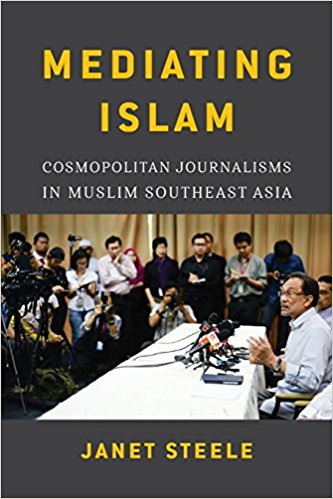
Broadening an overly narrow definition of Islamic journalism, Janet Steele examines day-to-day reporting practices of Muslim professionals, from conservative scripturalists to pluralist cosmopolitans, at five exemplary news organizations in Malaysia and Indonesia. At Sabili, established as an underground publication, journalists are ed for their ability at dakwah, or Islamic propagation. At Tempo, a news magazine banned during the Soeharto regime and considered progressive, many see their work as a manifestation of worship, but the publication itself is not considered Islamic. At Harakah, reporters support an Islamic political party, while at Republika they practice a “journalism of the Prophet” and see Islam as a market niche. Other news organizations, too, such as Malaysiakini, employ Muslim journalists. Steele, a longtime scholar of the region, explores how these publications observe universal principles of journalism through an Islamic idiom.
This event is on the record and open to the media.
About the speaker:
 Dr. Janet Steele is an associate professor of journalism at the George Washington University and the director of the Institute for Public Diplomacy and Global Communication. She received her Ph.D. in History from the Johns Hopkins University and focus on how culture is communicated through the mass media.
Dr. Janet Steele is an associate professor of journalism at the George Washington University and the director of the Institute for Public Diplomacy and Global Communication. She received her Ph.D. in History from the Johns Hopkins University and focus on how culture is communicated through the mass media.
Dr. Steele is a frequent visitor to Southeast Asia where she lectures on topics ranging from the role of the press in a democratic society to specialized courses on narrative journalism. Her book, “Wars Within: The Story of Tempo, an Independent Magazine in Soeharto’s Indonesia,” focuses on “Tempo” magazine and its relationship to the politics and culture of New Order Indonesia. Awarded two Fulbright teaching and research grants, she has served as a State Department speaker-specialist in Indonesia, Malaysia, Vietnam, Cambodia, Brunei, the Philippines, East Timor, Taiwan, Burma, Sudan, Egypt, India and Bangladesh. The author of numerous articles on journalism theory and practice, her most recent book, “Email Dari Amerika,” (Email from America), is a collection of newspaper columns written in Indonesian and originally published in the newspaper Surya. Her most recent book is Mediating Islam, Cosmopolitan Journalisms in Muslim Southeast Asia.
Co-sponsored by the Sigur Center for Asian Studies and the Elliott School of International Affairs
Audio Recording Part 1
Audio Recording Part 2
Audio Recording Part 3
Monday, March 26, 2018
12:45 PM – 2:00 PM
Gelman Library, Room 702
2130 H St. NW
Washington, DC 20052
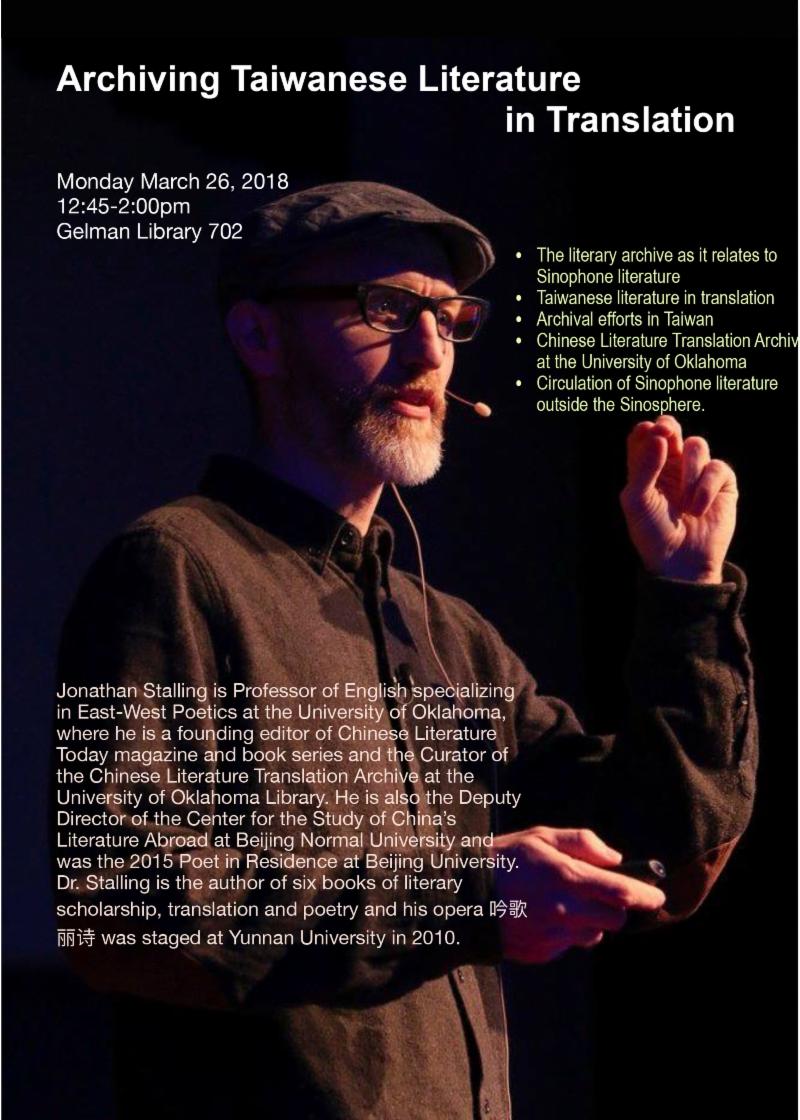
You are invited to join us for a discussion with Dr. Jonathan Stalling on the topic of “Archiving Taiwanese Literature in Translation.” Dr. Stalling will cover topics including:
* The literary archive as it relates to Sinophone literature
* Taiwanese literature in translation
* Archival efforts in Taiwan
* Chinese Literature Translation Archive at the University of Oklahoma
* Circulation of Sinophone literature outside the Sinosphere
And much more! Please come and join the discussion. This event is on the record and open to the media.
About the speaker:
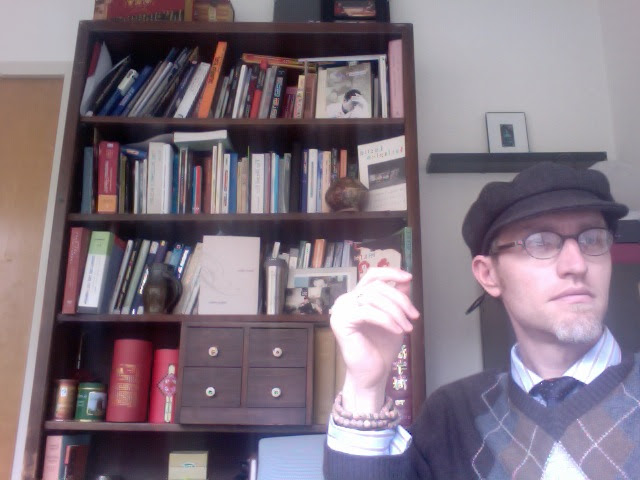 Dr. Jonathan Stalling is Professor of English specializing in East-West Poetics at the University of Oklahoma, where he is a founding editor of Chinese Literature Today magazine and book series and the Curator of the Chinese Literature Translation Archive at the University of Oklahoma Library. He is also the Deputy Director of the Center for the Study of China’s Literature Abroad at Beijing Normal University and was the 2015 Poet in Residence at Beijing University. Dr. Stalling is the author of six books of literary scholarship, translation and poetry and his opera 吟歌 丽诗 was staged at Yunnan University in 2010.
Dr. Jonathan Stalling is Professor of English specializing in East-West Poetics at the University of Oklahoma, where he is a founding editor of Chinese Literature Today magazine and book series and the Curator of the Chinese Literature Translation Archive at the University of Oklahoma Library. He is also the Deputy Director of the Center for the Study of China’s Literature Abroad at Beijing Normal University and was the 2015 Poet in Residence at Beijing University. Dr. Stalling is the author of six books of literary scholarship, translation and poetry and his opera 吟歌 丽诗 was staged at Yunnan University in 2010.
This event is co-sponsored by GW’s Department of East Asian Languages and Literatures, the Sigur Center for Asian Studies, and the Taiwan Academy.
Audio Recording Part 1
Audio Recording Part 2
Audio Recording Part 3
Thursday, March 22, 2018
1:00 PM – 2:30 PM
The Elliott School of International Affairs
1957 E Street, NW, Lindner Family Commons, Room 602
Washington, DC 20052
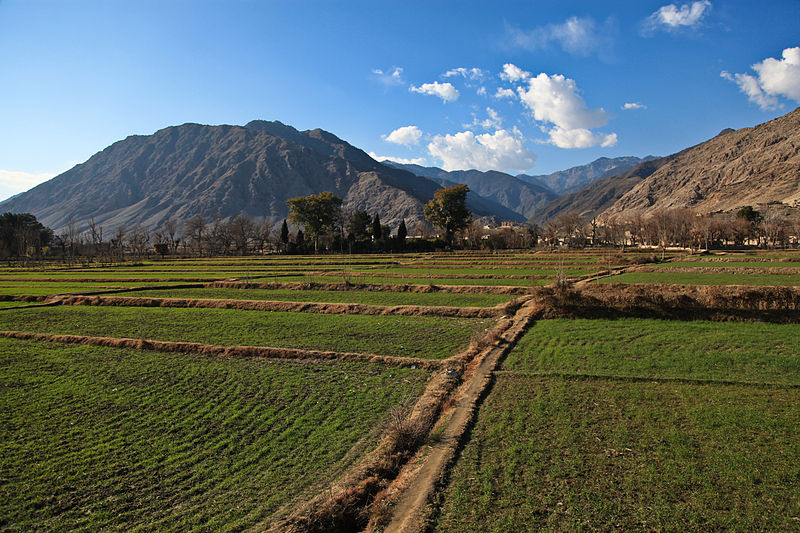
Among early modern Pashto writings the works of the Khattak tribal rulers are of particular importance as primary internal sources on the sociopolitical history and culture of Pashtuns in the period preceding the Afghan state building processes of the 18th century. The views of Pashtun military-administrative elite on governance are expounded most clearly in a range of texts, both in prose and verse, pertaining to the universal literary genre of “Mirrors for Princes” (Nasihat al-Muluk). Rooted in the medieval Persian classics, Pashto “Mirrors” nevertheless reflect in the foreground local ethnocultural peculiarities by shifting the very subject from statesmanship to chieftaincy, declaring regulations of the unwritten Code of Honor, and dealing with real politics through the examination of individual cases related to tribal conflicts.
The paper offers a survey of the nasihat al-muluk writings by Khushhal Khan Khattak (d. 1689) and Afzal Khan Khattak (d. circa 1740) including still poorly studied documents from the latter’s historiographical compilation “The Ornamented History” (Tarikh-i Murassaʿ). The texts under discussion prove that the outlook and behavioral patterns of Pashtun chieftains in pre-modern times stemmed from a combination, partly eclectic and contradictory, of Islamic precepts, feudal ideologies of the Mughal administrative system, and rules imposed by the Pashtun customary law (Pashtunwali).
This event is on the record and open to the media.
About the speaker:
 Dr. Mikhail Pelevin is Professor of Iranian Philology at St. Petersburg State University (Russian Federation). His main area of research is the early modern Pashto literature conceptualized as the most distinct and expressive element of social culture and ethnic self-identification of Pashtuns in the transition period from the late Middle Ages to modern times. Among his publications in Russian are books Khushhal Khan Khatak (1613-1689): the Beginning of the Afghan National Poetry (2001), Afghan Poetry in the First Half and the Middle of the Seventeenth century (2005), Afghan Literature of the Late Middle Ages (2010); a new book The Khattaks’ Chronicle: the Corpus and Functions of the Text is coming soon. Few recent articles are available in English, e.g.: “The Beginnings of Pashto Narrative Prose” (2017), “Persian Letters of a Pashtun Tribal Ruler on Judicial Settlement of a Political Conflict”, 1724 (2017), Daily Arithmetic of Pashtun Tribal Rulers: Numbers in The Khataks’ Chronicle (2016), “Ethnic consciousness of Pashtun Tribal Rulers in Pre-modern Times” (2015). M. Pelevin teaches courses on Persian, Pashto, the history of Persian and Pashto literatures. His other academic interests include Iranian dialectology and Muslim law.
Dr. Mikhail Pelevin is Professor of Iranian Philology at St. Petersburg State University (Russian Federation). His main area of research is the early modern Pashto literature conceptualized as the most distinct and expressive element of social culture and ethnic self-identification of Pashtuns in the transition period from the late Middle Ages to modern times. Among his publications in Russian are books Khushhal Khan Khatak (1613-1689): the Beginning of the Afghan National Poetry (2001), Afghan Poetry in the First Half and the Middle of the Seventeenth century (2005), Afghan Literature of the Late Middle Ages (2010); a new book The Khattaks’ Chronicle: the Corpus and Functions of the Text is coming soon. Few recent articles are available in English, e.g.: “The Beginnings of Pashto Narrative Prose” (2017), “Persian Letters of a Pashtun Tribal Ruler on Judicial Settlement of a Political Conflict”, 1724 (2017), Daily Arithmetic of Pashtun Tribal Rulers: Numbers in The Khataks’ Chronicle (2016), “Ethnic consciousness of Pashtun Tribal Rulers in Pre-modern Times” (2015). M. Pelevin teaches courses on Persian, Pashto, the history of Persian and Pashto literatures. His other academic interests include Iranian dialectology and Muslim law.
Tuesday, March 20, 2018
2:00 PM – 4:00 PM
The Elliott School of International Affairs
1957 E Street, NW, Lindner Family Commons, Room 602
Washington, DC 20052
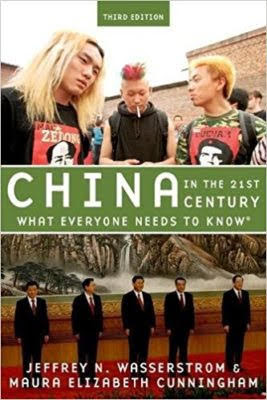
In this two-person illustrate talks, based on the fully revised and updated third edition of their coauthored book, China in the 21st Century: What Everyone Needs to Know, Jeffrey Wasserstrom and Maura Cunningham will explore issues associated with China’s meteoric rise, the distinctive and in many ways worrisome stamp Xi Jinping is putting on the country, and the local and global implications of recent events on the mainland and in Hong Kong. One theme they will stress is that even as China alters the current geopolitical order and has cities that often seem futuristic, paying attention to the past and how stories about history are used and misused inside and outside of the PRC has in some ways never been more important.
This event is on the record and open to the media.
About the speakers:
 Jeffrey Wasserstrom is Chancellor’s Professor of History at the University of California, Irvine; Editor of the Journal of Asian Studies; a member of Dissent Magazine‘s editorial board; and an academic editor of the China Channel of the Los Angeles Review of Books. He has contributed commentaries and reviews to the New York Times, the Wall Street Journal, the Financial Times, and various other newspapers and to magazines. His other books include, as editor, The Oxford Illustrated History of Modern China (2016). He received his PhD from UC Berkeley.
Jeffrey Wasserstrom is Chancellor’s Professor of History at the University of California, Irvine; Editor of the Journal of Asian Studies; a member of Dissent Magazine‘s editorial board; and an academic editor of the China Channel of the Los Angeles Review of Books. He has contributed commentaries and reviews to the New York Times, the Wall Street Journal, the Financial Times, and various other newspapers and to magazines. His other books include, as editor, The Oxford Illustrated History of Modern China (2016). He received his PhD from UC Berkeley.
 Maura Cunningham is an Associate at the University of Michigan’s Lieberthal-Rogel Center for Chinese Studies and edits the #Asianow blog of the Association for Asian Studies. She has written on modern Chinese history for the Wall Street Journal, the Los Angeles Review of Books, Ms., World Policy Journal, and Time. A past editor of China Beat, she is an advising editor to the China Channel of the Los Angeles Review of Books. She received her PhD from UC Irvine.
Maura Cunningham is an Associate at the University of Michigan’s Lieberthal-Rogel Center for Chinese Studies and edits the #Asianow blog of the Association for Asian Studies. She has written on modern Chinese history for the Wall Street Journal, the Los Angeles Review of Books, Ms., World Policy Journal, and Time. A past editor of China Beat, she is an advising editor to the China Channel of the Los Angeles Review of Books. She received her PhD from UC Irvine.
Audio Recording Part 1
Audio Recording Part 2
Wednesday, March 14, 2018
12:30 PM – 1:45 PM
The Elliott School of International Affairs
1957 E Street, NW, Lindner Family Commons, Room 602
Washington, DC 20052

From financial regulation to anti-trust enforcement to governance of the internet, policymakers in Washington and Japan are increasingly failing at the job of effective market regulation. In a provocative new book, Dr. Steven Vogel argues that the reason governments so often get this wrong is that they are stuck in a stale and misleading debate over government regulation versus market freedom. In fact, he argues, markets must by their nature be regulated, and the real debate is over how best to regulate in the public interest. In era of globalization and new, disruptive market platforms Vogel’s thoughtful pro-governance arguments have never been more relevant.
This event is on the record and open to the media.
About the speaker:
Dr. Steven Vogel is the Il Han new professor of Asian studies and a professor of political science at the University of California, Berkeley. He specializes in the political economy of advanced industrialized nations, especially Japan and the United States. Vogel’s new book is entitled Marketcraft: How Governments Make Markets Work and builds on three decades of scholarship. He is also the author of Japan Remodeled: How Government and Industry Are Reforming Japanese Capitalism, and his first book, Freer Markets, More Rules: Regulatory Reform in Advanced Industrial Countries, won the Masayoshi Ohira Memorial Prize. He has a B.A. from Princeton University and a Ph.D. in Political Science from the University of California, Berkeley.
This event is co-sponsored by the Institute for International Economic Policy and the Sigur Center for Asian Studies. In cooperation with Asia Policy Point.
Audio Recording Part 1
Audio Recording Part 2
Wednesday, February 28, 2018
1:00 PM – 2:30 PM
The Elliott School of International Affairs
1957 E Street, NW, Room 505
Washington, DC 20052
The Chinese Communist Party is pursuing a distinctively Leninist path to soft power. It depicts public opinion as a battlefield upon which a highly disciplined political struggle must be waged and won. This talk documents one aspect of that struggle: how the Party is leveraging its economic muscle and the technologies of the information age to sanitize the historical record and globalize its own competing narratives. The talk also illustrates the vulnerabilities introduced by our deepening digital dependence and the challenges we confront in safeguarding the integrity of our knowledge base.
About the speaker:
Glenn Tiffert, a Visiting Fellow at the Hoover Institution, earned his Ph.D. in History from the University of California, Berkeley. He has taught at Berkeley, Harvard, University of Michigan and UCLA, and currently serves on the Projects and Proposals Committee of the American Society for Legal History. Glenn’s research interests center on 20th century China, particularly its experience of revolution. At the vanguard among scholars of modern Chinese legal history, he has published works in English and Chinese on the construction of the modern Chinese court system and judiciary, the drafting of the 1954 PRC Constitution, the legacies of Nationalist judicial modernization to the PRC, and the hidden genealogy of current PRC legal policy. Glenn is also pioneering the integration of computational methods drawn from data science into the study of Chinese history. Using China as an illustrative case, his latest research empirically documents the alarming synergies between digitization, intellectual property law, censorship, and authoritarianism, and exposes how emerging technologies could spur Orwellian manipulation of the historical record and memory on a global scale.
Wednesday, February 7, 2018
Lunch: 12:00 PM – 12:30 PM
Roundtable Discussion: 12:30 PM – 2:00 PM
The Elliott School of International Affairs
1957 E Street, NW, Lindner Commons, Room 602 (6th Floor)
Washington, DC 20052
China’s stepped up pressure on Taiwan in recent weeks – from Beijing’s unilateral launch of new air routes, to the row with hotel giant Marriott over its website characterization of Taiwan – is once again bringing cross Strait relations into question. This is occurring in the context of China’s rising military profile and growing assertiveness in East Asia, which continues to raise region-wide concern. This Roundtable will assess key political and strategic dynamics of current cross Strait relations and what the trends portend.
“Chinese Strategic Pressure and Impact on Taiwan”
“Taiwan’s Southbound Policy and the China Factor”
“Domestic Politics and Taiwan’s Options on Cross Strait Relations”
Moderator: Edward McCord, Professor of History and International Affairs and Director of the Taiwan Education and Research Program at GW
About the Participants:
Mark Stokes is the Executive Director of the Project 2049 Institute, which seeks to guide decision makers toward a more secure Asia. Prior to his current position, he was the founder and president of Quantum Pacific Enterprises, an international consulting firm, and vice president and Taiwan country manager for Raytheon International. Mr. Stokes has also served as a senior associate at the Center for Strategic and International Studies and as a member of the Board of Governors of the American Chamber of Commerce in Taiwan. A 20-year U.S. Air Force veteran, Mr. Stokes was the team chief and senior country director for the People’s Republic of China, Taiwan and Mongolia in the Office of the Assistant Secretary of Defense for International Security Affairs. He holds a B.A. from Texas A&M University and a M.A. from Boston University and the Naval Postgraduate School.
Dr. Joyce Juo-yu Lin is the current Director of the ASEAN Studies Center at Tamkang University and professor of the University’s Department of Diplomacy and International Relations, and is a specialist in Southeast Asian political and economic issues. She has researched and written academic papers focusing on the possibility of a free trade agreement between China and ASEAN, as well as the motivations behind pursuing a free trade agreement, and the possibility of US influence in this area. Prior to her current positions, Dr. Lin was a Southeast Asia correspondent for the China Times, and was a visiting researcher at Georgetown University. She was also the CNAPS visiting Fellow at the Brookings Institution. Dr. Lin holds a B.A., M.A. and Ph.D from the National Taiwan University.
Dr. Shelley Rigger is the Brown Professor and Assistant Dean for Educational Policy at Davidson College focusing on East Asian politics. She has written two books analyzing Taiwan’s domestic politics, Politics in Taiwan: Voting for Democracy (Routledge 1999) and From Opposition to Power: Taiwan’s Democratic Progressive Party (Lynne Rienner Publishers 2001), and has published articles concentrating on the national identity issue in Taiwan-China relations, and other related topics. Her current research studies include the effects of cross-strait economic interactions on Taiwan people’s perceptions of mainland China. Dr. Rigger earned her bachelor’s degree at Princeton University, and holds a Ph.D. from Harvard University.
Dr. Edward McCord is a Professor of History and International Affairs and Director of the Taiwan Education and Research Program at GW. He lived and studied for five years in Taiwan and the People’s Republic of China, and is currently working on a major book-length project that examines militia organizations in Republican China (1911-1949). Professor McCord’s research centers on the history of Chinese military-civil relations in the modern era. Prior to joining GW, he was the Assistant Professor of History at the University of Florida. He has experience teaching Chinese history at the Foreign Service Institute and the Smithsonian Institution’s Campus on the Mall program. Professor McCord has a M.A. and Ph.D. in history from the University of Michigan.

 Ornit Shani is a scholar of politics and modern history of India. Her research focuses on the modern history of democracy and citizenship in India, as well as the rise of Hindu Nationalism, identity and caste politics, and communal and caste violence. Dr. Ornit was a Research Fellow at St. John’s College, Cambridge University and holds a PhD from the University of Cambridge. Her new book How India Became Democratic: Citizenship and the Making of the Universal Franchise explores the creation of the electoral roll and universal adult franchise in India. Dr. Shani’s other research interests include modern South Asia, democracy and democratization, India’s constitutionalism, India legal history, Indian elections, nationalism, and identity politics.
Ornit Shani is a scholar of politics and modern history of India. Her research focuses on the modern history of democracy and citizenship in India, as well as the rise of Hindu Nationalism, identity and caste politics, and communal and caste violence. Dr. Ornit was a Research Fellow at St. John’s College, Cambridge University and holds a PhD from the University of Cambridge. Her new book How India Became Democratic: Citizenship and the Making of the Universal Franchise explores the creation of the electoral roll and universal adult franchise in India. Dr. Shani’s other research interests include modern South Asia, democracy and democratization, India’s constitutionalism, India legal history, Indian elections, nationalism, and identity politics.